A Study on Globalization's Impact on M&S Financial Performance
VerifiedAdded on 2020/12/26
|27
|6892
|324
Project
AI Summary
This research project investigates the impact of globalization on Marks & Spencer (M&S), a major British multinational retailer. The study explores how globalization influences M&S's financial performance, its success in foreign markets, and the challenges it faces. The project includes a literature review examining the concept of globalization and its benefits, as well as its influence on firm's financial performance and contribution to success in foreign markets. The research methodology combines qualitative and quantitative methods. The project analyzes themes such as the concept of globalization, its impact on the organization, the challenges and benefits of globalization, and its effects on sales and employment. The conclusion provides recommendations based on the research findings. An alternative research methodology is also presented, along with references and appendices including a questionnaire.

RESEARCH PROJECT
Paraphrase This Document
Need a fresh take? Get an instant paraphrase of this document with our AI Paraphraser
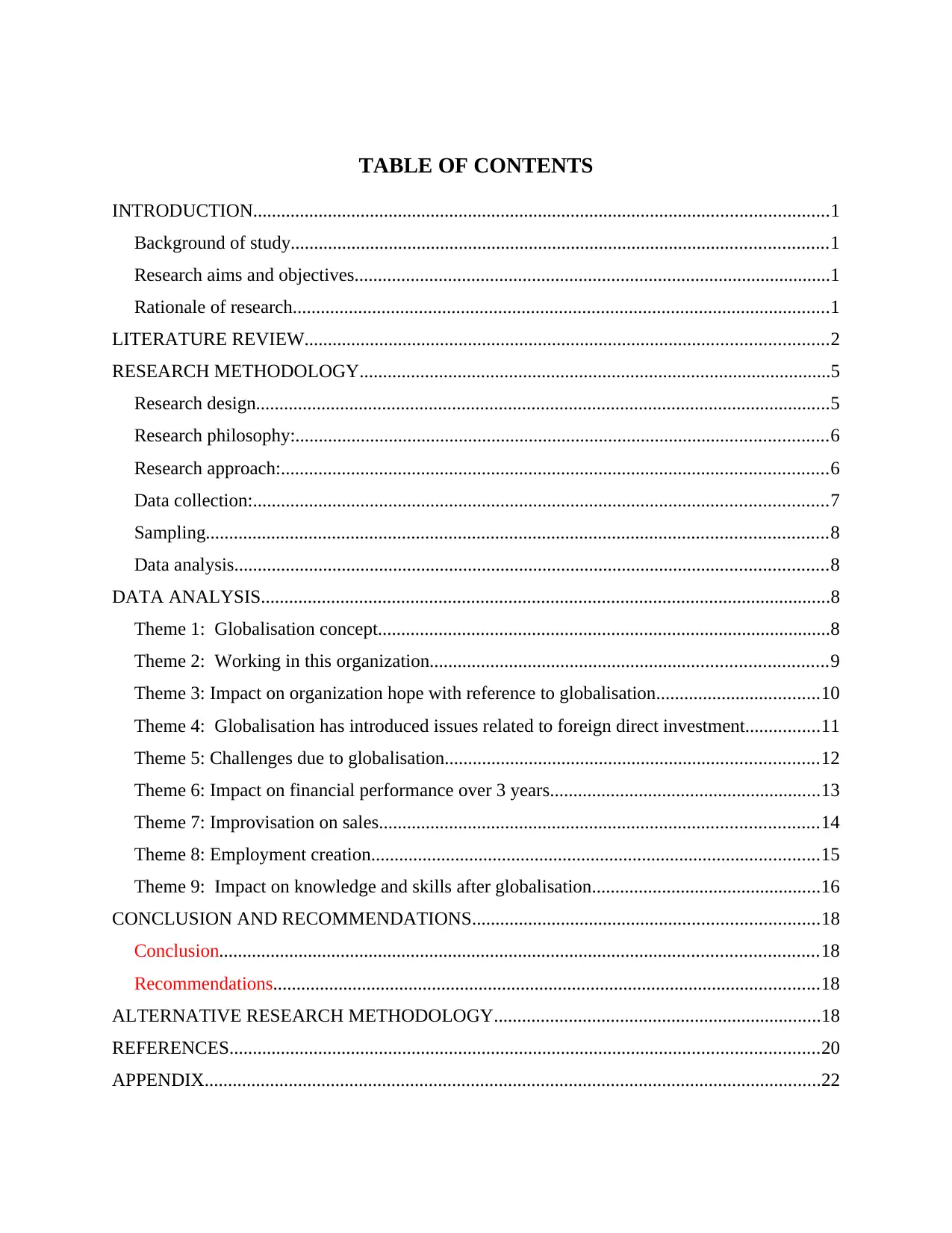
TABLE OF CONTENTS
INTRODUCTION...........................................................................................................................1
Background of study...................................................................................................................1
Research aims and objectives......................................................................................................1
Rationale of research...................................................................................................................1
LITERATURE REVIEW................................................................................................................2
RESEARCH METHODOLOGY.....................................................................................................5
Research design...........................................................................................................................5
Research philosophy:..................................................................................................................6
Research approach:.....................................................................................................................6
Data collection:...........................................................................................................................7
Sampling.....................................................................................................................................8
Data analysis...............................................................................................................................8
DATA ANALYSIS..........................................................................................................................8
Theme 1: Globalisation concept.................................................................................................8
Theme 2: Working in this organization.....................................................................................9
Theme 3: Impact on organization hope with reference to globalisation...................................10
Theme 4: Globalisation has introduced issues related to foreign direct investment................11
Theme 5: Challenges due to globalisation................................................................................12
Theme 6: Impact on financial performance over 3 years..........................................................13
Theme 7: Improvisation on sales..............................................................................................14
Theme 8: Employment creation................................................................................................15
Theme 9: Impact on knowledge and skills after globalisation.................................................16
CONCLUSION AND RECOMMENDATIONS..........................................................................18
Conclusion................................................................................................................................18
Recommendations.....................................................................................................................18
ALTERNATIVE RESEARCH METHODOLOGY......................................................................18
REFERENCES..............................................................................................................................20
APPENDIX....................................................................................................................................22
INTRODUCTION...........................................................................................................................1
Background of study...................................................................................................................1
Research aims and objectives......................................................................................................1
Rationale of research...................................................................................................................1
LITERATURE REVIEW................................................................................................................2
RESEARCH METHODOLOGY.....................................................................................................5
Research design...........................................................................................................................5
Research philosophy:..................................................................................................................6
Research approach:.....................................................................................................................6
Data collection:...........................................................................................................................7
Sampling.....................................................................................................................................8
Data analysis...............................................................................................................................8
DATA ANALYSIS..........................................................................................................................8
Theme 1: Globalisation concept.................................................................................................8
Theme 2: Working in this organization.....................................................................................9
Theme 3: Impact on organization hope with reference to globalisation...................................10
Theme 4: Globalisation has introduced issues related to foreign direct investment................11
Theme 5: Challenges due to globalisation................................................................................12
Theme 6: Impact on financial performance over 3 years..........................................................13
Theme 7: Improvisation on sales..............................................................................................14
Theme 8: Employment creation................................................................................................15
Theme 9: Impact on knowledge and skills after globalisation.................................................16
CONCLUSION AND RECOMMENDATIONS..........................................................................18
Conclusion................................................................................................................................18
Recommendations.....................................................................................................................18
ALTERNATIVE RESEARCH METHODOLOGY......................................................................18
REFERENCES..............................................................................................................................20
APPENDIX....................................................................................................................................22

Questionnaire............................................................................................................................22
⊘ This is a preview!⊘
Do you want full access?
Subscribe today to unlock all pages.

Trusted by 1+ million students worldwide
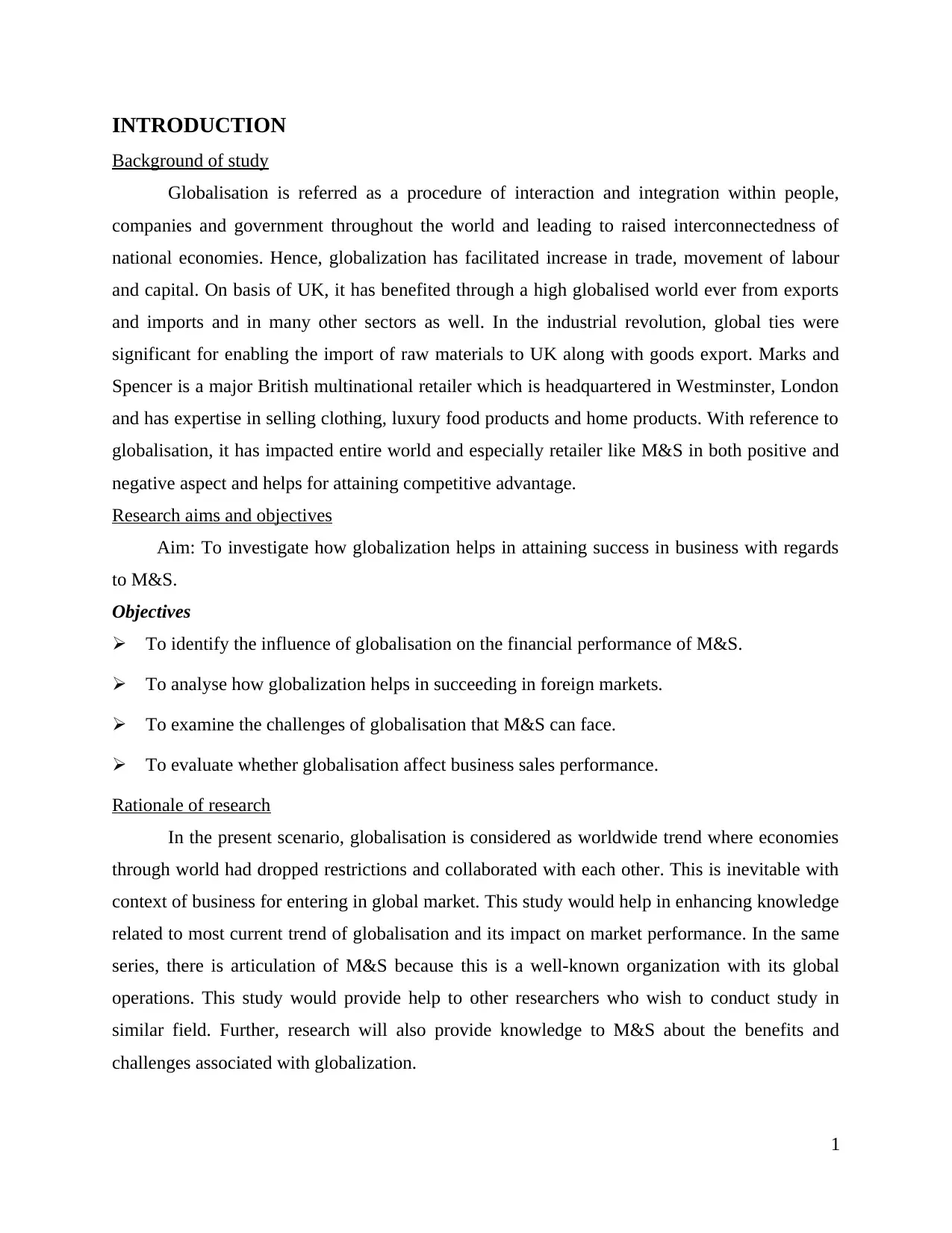
INTRODUCTION
Background of study
Globalisation is referred as a procedure of interaction and integration within people,
companies and government throughout the world and leading to raised interconnectedness of
national economies. Hence, globalization has facilitated increase in trade, movement of labour
and capital. On basis of UK, it has benefited through a high globalised world ever from exports
and imports and in many other sectors as well. In the industrial revolution, global ties were
significant for enabling the import of raw materials to UK along with goods export. Marks and
Spencer is a major British multinational retailer which is headquartered in Westminster, London
and has expertise in selling clothing, luxury food products and home products. With reference to
globalisation, it has impacted entire world and especially retailer like M&S in both positive and
negative aspect and helps for attaining competitive advantage.
Research aims and objectives
Aim: To investigate how globalization helps in attaining success in business with regards
to M&S.
Objectives
To identify the influence of globalisation on the financial performance of M&S.
To analyse how globalization helps in succeeding in foreign markets.
To examine the challenges of globalisation that M&S can face.
To evaluate whether globalisation affect business sales performance.
Rationale of research
In the present scenario, globalisation is considered as worldwide trend where economies
through world had dropped restrictions and collaborated with each other. This is inevitable with
context of business for entering in global market. This study would help in enhancing knowledge
related to most current trend of globalisation and its impact on market performance. In the same
series, there is articulation of M&S because this is a well-known organization with its global
operations. This study would provide help to other researchers who wish to conduct study in
similar field. Further, research will also provide knowledge to M&S about the benefits and
challenges associated with globalization.
1
Background of study
Globalisation is referred as a procedure of interaction and integration within people,
companies and government throughout the world and leading to raised interconnectedness of
national economies. Hence, globalization has facilitated increase in trade, movement of labour
and capital. On basis of UK, it has benefited through a high globalised world ever from exports
and imports and in many other sectors as well. In the industrial revolution, global ties were
significant for enabling the import of raw materials to UK along with goods export. Marks and
Spencer is a major British multinational retailer which is headquartered in Westminster, London
and has expertise in selling clothing, luxury food products and home products. With reference to
globalisation, it has impacted entire world and especially retailer like M&S in both positive and
negative aspect and helps for attaining competitive advantage.
Research aims and objectives
Aim: To investigate how globalization helps in attaining success in business with regards
to M&S.
Objectives
To identify the influence of globalisation on the financial performance of M&S.
To analyse how globalization helps in succeeding in foreign markets.
To examine the challenges of globalisation that M&S can face.
To evaluate whether globalisation affect business sales performance.
Rationale of research
In the present scenario, globalisation is considered as worldwide trend where economies
through world had dropped restrictions and collaborated with each other. This is inevitable with
context of business for entering in global market. This study would help in enhancing knowledge
related to most current trend of globalisation and its impact on market performance. In the same
series, there is articulation of M&S because this is a well-known organization with its global
operations. This study would provide help to other researchers who wish to conduct study in
similar field. Further, research will also provide knowledge to M&S about the benefits and
challenges associated with globalization.
1
Paraphrase This Document
Need a fresh take? Get an instant paraphrase of this document with our AI Paraphraser
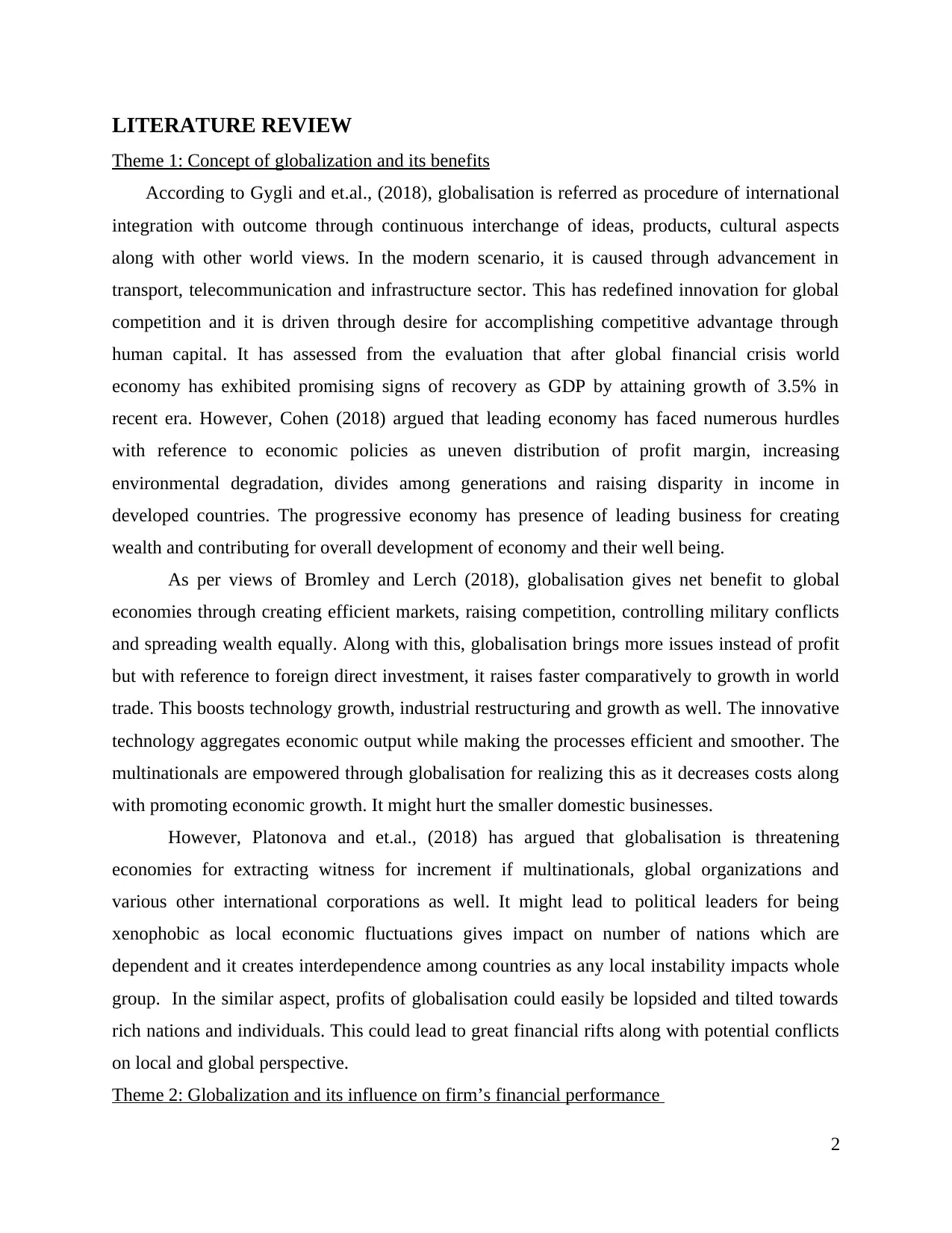
LITERATURE REVIEW
Theme 1: Concept of globalization and its benefits
According to Gygli and et.al., (2018), globalisation is referred as procedure of international
integration with outcome through continuous interchange of ideas, products, cultural aspects
along with other world views. In the modern scenario, it is caused through advancement in
transport, telecommunication and infrastructure sector. This has redefined innovation for global
competition and it is driven through desire for accomplishing competitive advantage through
human capital. It has assessed from the evaluation that after global financial crisis world
economy has exhibited promising signs of recovery as GDP by attaining growth of 3.5% in
recent era. However, Cohen (2018) argued that leading economy has faced numerous hurdles
with reference to economic policies as uneven distribution of profit margin, increasing
environmental degradation, divides among generations and raising disparity in income in
developed countries. The progressive economy has presence of leading business for creating
wealth and contributing for overall development of economy and their well being.
As per views of Bromley and Lerch (2018), globalisation gives net benefit to global
economies through creating efficient markets, raising competition, controlling military conflicts
and spreading wealth equally. Along with this, globalisation brings more issues instead of profit
but with reference to foreign direct investment, it raises faster comparatively to growth in world
trade. This boosts technology growth, industrial restructuring and growth as well. The innovative
technology aggregates economic output while making the processes efficient and smoother. The
multinationals are empowered through globalisation for realizing this as it decreases costs along
with promoting economic growth. It might hurt the smaller domestic businesses.
However, Platonova and et.al., (2018) has argued that globalisation is threatening
economies for extracting witness for increment if multinationals, global organizations and
various other international corporations as well. It might lead to political leaders for being
xenophobic as local economic fluctuations gives impact on number of nations which are
dependent and it creates interdependence among countries as any local instability impacts whole
group. In the similar aspect, profits of globalisation could easily be lopsided and tilted towards
rich nations and individuals. This could lead to great financial rifts along with potential conflicts
on local and global perspective.
Theme 2: Globalization and its influence on firm’s financial performance
2
Theme 1: Concept of globalization and its benefits
According to Gygli and et.al., (2018), globalisation is referred as procedure of international
integration with outcome through continuous interchange of ideas, products, cultural aspects
along with other world views. In the modern scenario, it is caused through advancement in
transport, telecommunication and infrastructure sector. This has redefined innovation for global
competition and it is driven through desire for accomplishing competitive advantage through
human capital. It has assessed from the evaluation that after global financial crisis world
economy has exhibited promising signs of recovery as GDP by attaining growth of 3.5% in
recent era. However, Cohen (2018) argued that leading economy has faced numerous hurdles
with reference to economic policies as uneven distribution of profit margin, increasing
environmental degradation, divides among generations and raising disparity in income in
developed countries. The progressive economy has presence of leading business for creating
wealth and contributing for overall development of economy and their well being.
As per views of Bromley and Lerch (2018), globalisation gives net benefit to global
economies through creating efficient markets, raising competition, controlling military conflicts
and spreading wealth equally. Along with this, globalisation brings more issues instead of profit
but with reference to foreign direct investment, it raises faster comparatively to growth in world
trade. This boosts technology growth, industrial restructuring and growth as well. The innovative
technology aggregates economic output while making the processes efficient and smoother. The
multinationals are empowered through globalisation for realizing this as it decreases costs along
with promoting economic growth. It might hurt the smaller domestic businesses.
However, Platonova and et.al., (2018) has argued that globalisation is threatening
economies for extracting witness for increment if multinationals, global organizations and
various other international corporations as well. It might lead to political leaders for being
xenophobic as local economic fluctuations gives impact on number of nations which are
dependent and it creates interdependence among countries as any local instability impacts whole
group. In the similar aspect, profits of globalisation could easily be lopsided and tilted towards
rich nations and individuals. This could lead to great financial rifts along with potential conflicts
on local and global perspective.
Theme 2: Globalization and its influence on firm’s financial performance
2
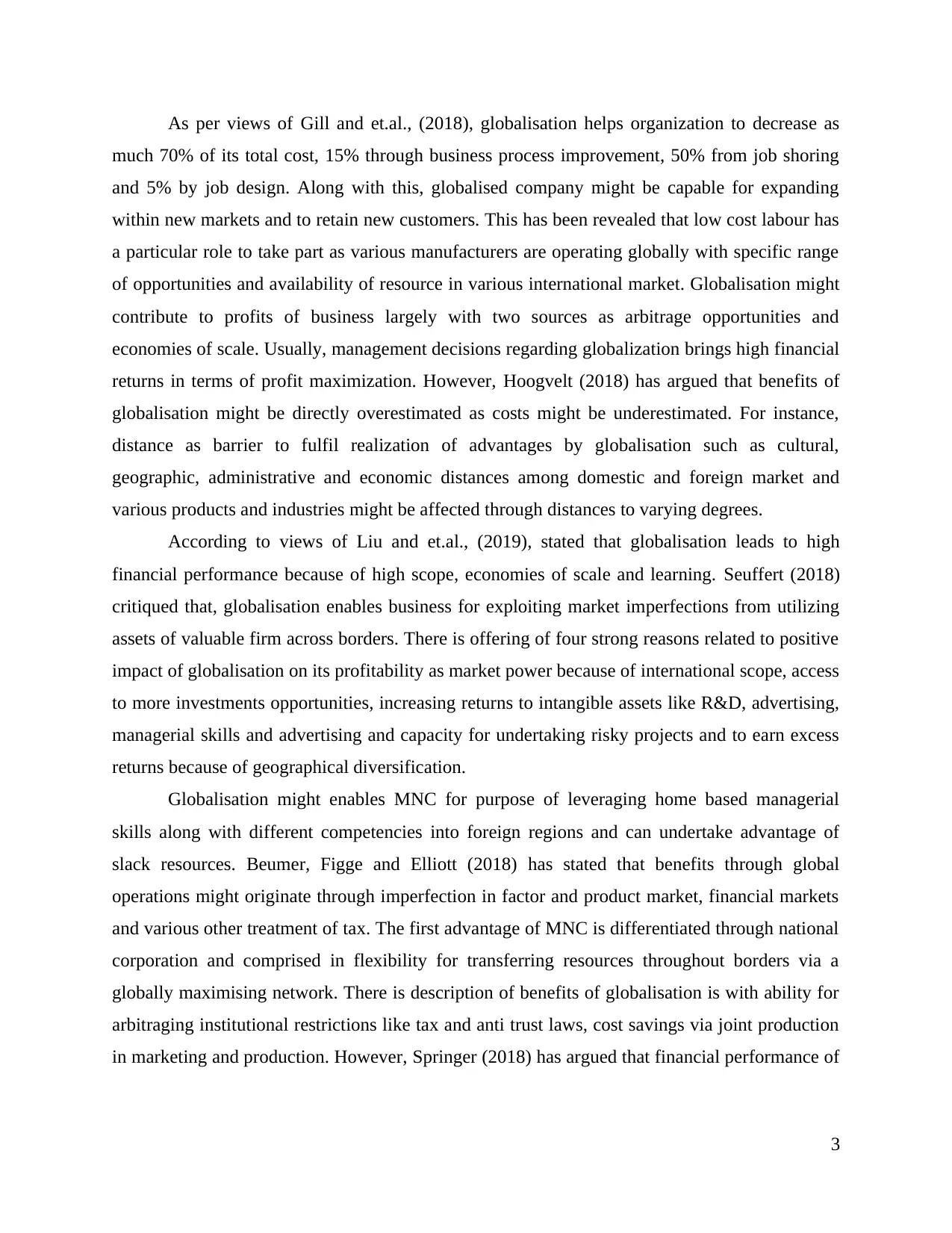
As per views of Gill and et.al., (2018), globalisation helps organization to decrease as
much 70% of its total cost, 15% through business process improvement, 50% from job shoring
and 5% by job design. Along with this, globalised company might be capable for expanding
within new markets and to retain new customers. This has been revealed that low cost labour has
a particular role to take part as various manufacturers are operating globally with specific range
of opportunities and availability of resource in various international market. Globalisation might
contribute to profits of business largely with two sources as arbitrage opportunities and
economies of scale. Usually, management decisions regarding globalization brings high financial
returns in terms of profit maximization. However, Hoogvelt (2018) has argued that benefits of
globalisation might be directly overestimated as costs might be underestimated. For instance,
distance as barrier to fulfil realization of advantages by globalisation such as cultural,
geographic, administrative and economic distances among domestic and foreign market and
various products and industries might be affected through distances to varying degrees.
According to views of Liu and et.al., (2019), stated that globalisation leads to high
financial performance because of high scope, economies of scale and learning. Seuffert (2018)
critiqued that, globalisation enables business for exploiting market imperfections from utilizing
assets of valuable firm across borders. There is offering of four strong reasons related to positive
impact of globalisation on its profitability as market power because of international scope, access
to more investments opportunities, increasing returns to intangible assets like R&D, advertising,
managerial skills and advertising and capacity for undertaking risky projects and to earn excess
returns because of geographical diversification.
Globalisation might enables MNC for purpose of leveraging home based managerial
skills along with different competencies into foreign regions and can undertake advantage of
slack resources. Beumer, Figge and Elliott (2018) has stated that benefits through global
operations might originate through imperfection in factor and product market, financial markets
and various other treatment of tax. The first advantage of MNC is differentiated through national
corporation and comprised in flexibility for transferring resources throughout borders via a
globally maximising network. There is description of benefits of globalisation is with ability for
arbitraging institutional restrictions like tax and anti trust laws, cost savings via joint production
in marketing and production. However, Springer (2018) has argued that financial performance of
3
much 70% of its total cost, 15% through business process improvement, 50% from job shoring
and 5% by job design. Along with this, globalised company might be capable for expanding
within new markets and to retain new customers. This has been revealed that low cost labour has
a particular role to take part as various manufacturers are operating globally with specific range
of opportunities and availability of resource in various international market. Globalisation might
contribute to profits of business largely with two sources as arbitrage opportunities and
economies of scale. Usually, management decisions regarding globalization brings high financial
returns in terms of profit maximization. However, Hoogvelt (2018) has argued that benefits of
globalisation might be directly overestimated as costs might be underestimated. For instance,
distance as barrier to fulfil realization of advantages by globalisation such as cultural,
geographic, administrative and economic distances among domestic and foreign market and
various products and industries might be affected through distances to varying degrees.
According to views of Liu and et.al., (2019), stated that globalisation leads to high
financial performance because of high scope, economies of scale and learning. Seuffert (2018)
critiqued that, globalisation enables business for exploiting market imperfections from utilizing
assets of valuable firm across borders. There is offering of four strong reasons related to positive
impact of globalisation on its profitability as market power because of international scope, access
to more investments opportunities, increasing returns to intangible assets like R&D, advertising,
managerial skills and advertising and capacity for undertaking risky projects and to earn excess
returns because of geographical diversification.
Globalisation might enables MNC for purpose of leveraging home based managerial
skills along with different competencies into foreign regions and can undertake advantage of
slack resources. Beumer, Figge and Elliott (2018) has stated that benefits through global
operations might originate through imperfection in factor and product market, financial markets
and various other treatment of tax. The first advantage of MNC is differentiated through national
corporation and comprised in flexibility for transferring resources throughout borders via a
globally maximising network. There is description of benefits of globalisation is with ability for
arbitraging institutional restrictions like tax and anti trust laws, cost savings via joint production
in marketing and production. However, Springer (2018) has argued that financial performance of
3
⊘ This is a preview!⊘
Do you want full access?
Subscribe today to unlock all pages.

Trusted by 1+ million students worldwide
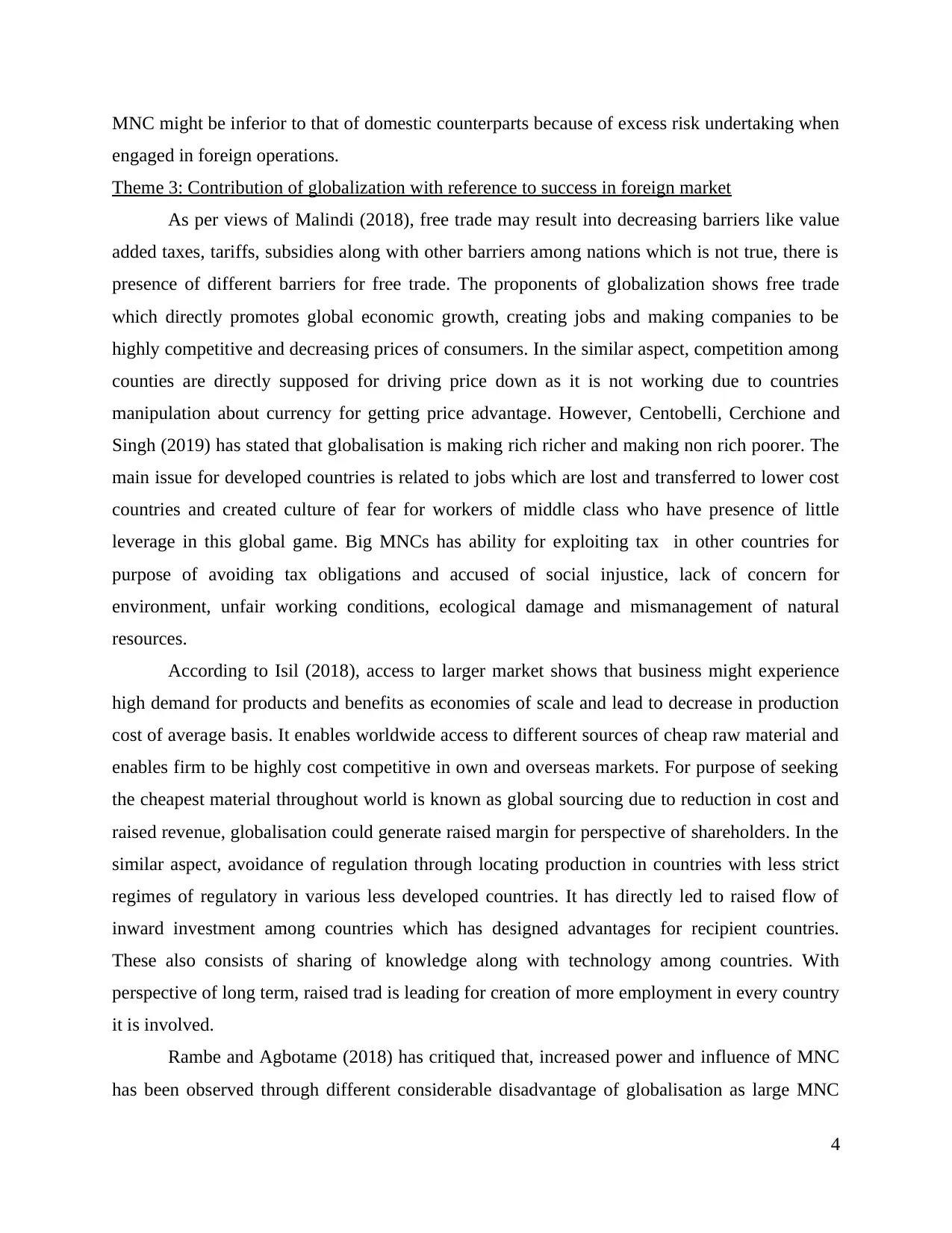
MNC might be inferior to that of domestic counterparts because of excess risk undertaking when
engaged in foreign operations.
Theme 3: Contribution of globalization with reference to success in foreign market
As per views of Malindi (2018), free trade may result into decreasing barriers like value
added taxes, tariffs, subsidies along with other barriers among nations which is not true, there is
presence of different barriers for free trade. The proponents of globalization shows free trade
which directly promotes global economic growth, creating jobs and making companies to be
highly competitive and decreasing prices of consumers. In the similar aspect, competition among
counties are directly supposed for driving price down as it is not working due to countries
manipulation about currency for getting price advantage. However, Centobelli, Cerchione and
Singh (2019) has stated that globalisation is making rich richer and making non rich poorer. The
main issue for developed countries is related to jobs which are lost and transferred to lower cost
countries and created culture of fear for workers of middle class who have presence of little
leverage in this global game. Big MNCs has ability for exploiting tax in other countries for
purpose of avoiding tax obligations and accused of social injustice, lack of concern for
environment, unfair working conditions, ecological damage and mismanagement of natural
resources.
According to Isil (2018), access to larger market shows that business might experience
high demand for products and benefits as economies of scale and lead to decrease in production
cost of average basis. It enables worldwide access to different sources of cheap raw material and
enables firm to be highly cost competitive in own and overseas markets. For purpose of seeking
the cheapest material throughout world is known as global sourcing due to reduction in cost and
raised revenue, globalisation could generate raised margin for perspective of shareholders. In the
similar aspect, avoidance of regulation through locating production in countries with less strict
regimes of regulatory in various less developed countries. It has directly led to raised flow of
inward investment among countries which has designed advantages for recipient countries.
These also consists of sharing of knowledge along with technology among countries. With
perspective of long term, raised trad is leading for creation of more employment in every country
it is involved.
Rambe and Agbotame (2018) has critiqued that, increased power and influence of MNC
has been observed through different considerable disadvantage of globalisation as large MNC
4
engaged in foreign operations.
Theme 3: Contribution of globalization with reference to success in foreign market
As per views of Malindi (2018), free trade may result into decreasing barriers like value
added taxes, tariffs, subsidies along with other barriers among nations which is not true, there is
presence of different barriers for free trade. The proponents of globalization shows free trade
which directly promotes global economic growth, creating jobs and making companies to be
highly competitive and decreasing prices of consumers. In the similar aspect, competition among
counties are directly supposed for driving price down as it is not working due to countries
manipulation about currency for getting price advantage. However, Centobelli, Cerchione and
Singh (2019) has stated that globalisation is making rich richer and making non rich poorer. The
main issue for developed countries is related to jobs which are lost and transferred to lower cost
countries and created culture of fear for workers of middle class who have presence of little
leverage in this global game. Big MNCs has ability for exploiting tax in other countries for
purpose of avoiding tax obligations and accused of social injustice, lack of concern for
environment, unfair working conditions, ecological damage and mismanagement of natural
resources.
According to Isil (2018), access to larger market shows that business might experience
high demand for products and benefits as economies of scale and lead to decrease in production
cost of average basis. It enables worldwide access to different sources of cheap raw material and
enables firm to be highly cost competitive in own and overseas markets. For purpose of seeking
the cheapest material throughout world is known as global sourcing due to reduction in cost and
raised revenue, globalisation could generate raised margin for perspective of shareholders. In the
similar aspect, avoidance of regulation through locating production in countries with less strict
regimes of regulatory in various less developed countries. It has directly led to raised flow of
inward investment among countries which has designed advantages for recipient countries.
These also consists of sharing of knowledge along with technology among countries. With
perspective of long term, raised trad is leading for creation of more employment in every country
it is involved.
Rambe and Agbotame (2018) has critiqued that, increased power and influence of MNC
has been observed through different considerable disadvantage of globalisation as large MNC
4
Paraphrase This Document
Need a fresh take? Get an instant paraphrase of this document with our AI Paraphraser
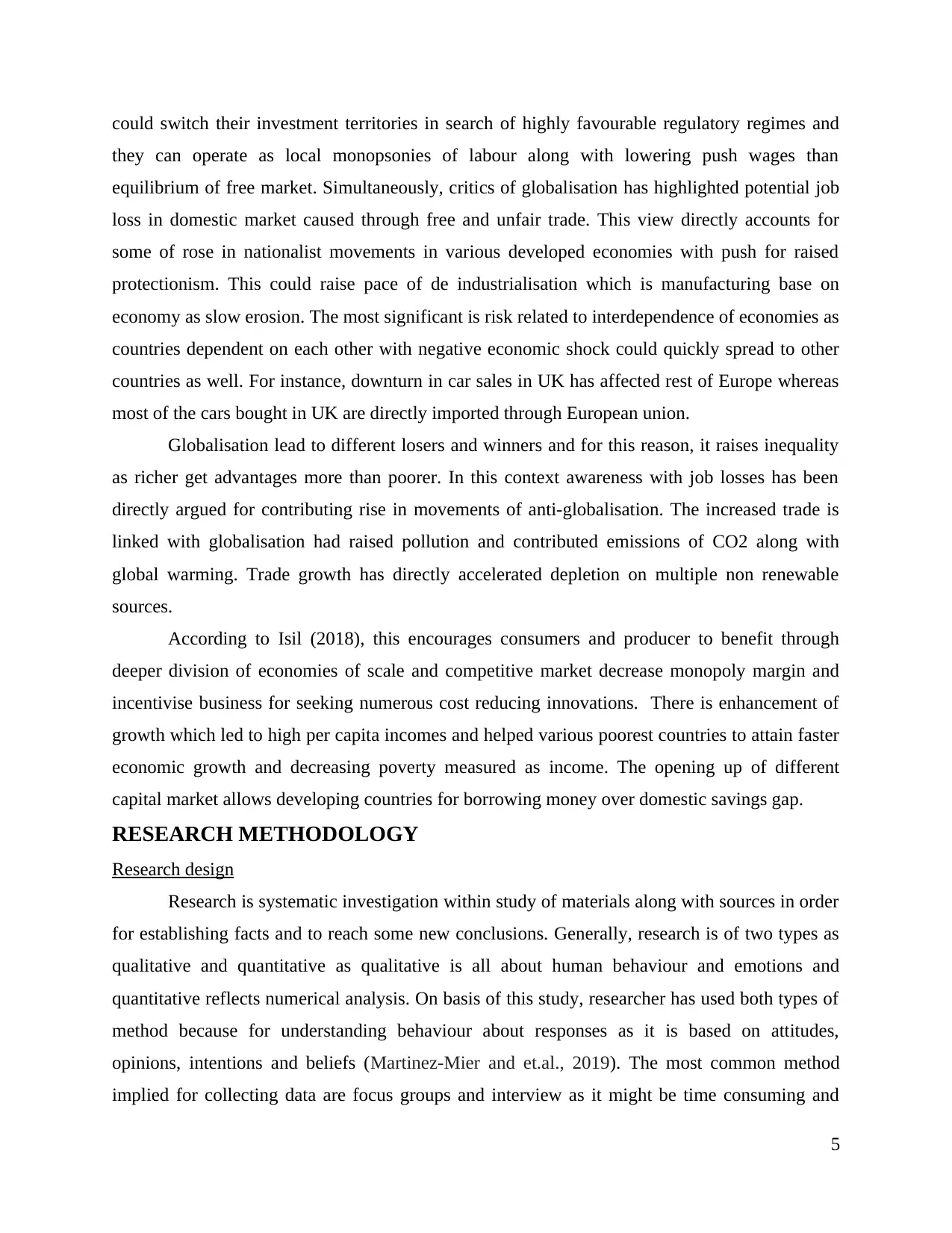
could switch their investment territories in search of highly favourable regulatory regimes and
they can operate as local monopsonies of labour along with lowering push wages than
equilibrium of free market. Simultaneously, critics of globalisation has highlighted potential job
loss in domestic market caused through free and unfair trade. This view directly accounts for
some of rose in nationalist movements in various developed economies with push for raised
protectionism. This could raise pace of de industrialisation which is manufacturing base on
economy as slow erosion. The most significant is risk related to interdependence of economies as
countries dependent on each other with negative economic shock could quickly spread to other
countries as well. For instance, downturn in car sales in UK has affected rest of Europe whereas
most of the cars bought in UK are directly imported through European union.
Globalisation lead to different losers and winners and for this reason, it raises inequality
as richer get advantages more than poorer. In this context awareness with job losses has been
directly argued for contributing rise in movements of anti-globalisation. The increased trade is
linked with globalisation had raised pollution and contributed emissions of CO2 along with
global warming. Trade growth has directly accelerated depletion on multiple non renewable
sources.
According to Isil (2018), this encourages consumers and producer to benefit through
deeper division of economies of scale and competitive market decrease monopoly margin and
incentivise business for seeking numerous cost reducing innovations. There is enhancement of
growth which led to high per capita incomes and helped various poorest countries to attain faster
economic growth and decreasing poverty measured as income. The opening up of different
capital market allows developing countries for borrowing money over domestic savings gap.
RESEARCH METHODOLOGY
Research design
Research is systematic investigation within study of materials along with sources in order
for establishing facts and to reach some new conclusions. Generally, research is of two types as
qualitative and quantitative as qualitative is all about human behaviour and emotions and
quantitative reflects numerical analysis. On basis of this study, researcher has used both types of
method because for understanding behaviour about responses as it is based on attitudes,
opinions, intentions and beliefs (Martinez-Mier and et.al., 2019). The most common method
implied for collecting data are focus groups and interview as it might be time consuming and
5
they can operate as local monopsonies of labour along with lowering push wages than
equilibrium of free market. Simultaneously, critics of globalisation has highlighted potential job
loss in domestic market caused through free and unfair trade. This view directly accounts for
some of rose in nationalist movements in various developed economies with push for raised
protectionism. This could raise pace of de industrialisation which is manufacturing base on
economy as slow erosion. The most significant is risk related to interdependence of economies as
countries dependent on each other with negative economic shock could quickly spread to other
countries as well. For instance, downturn in car sales in UK has affected rest of Europe whereas
most of the cars bought in UK are directly imported through European union.
Globalisation lead to different losers and winners and for this reason, it raises inequality
as richer get advantages more than poorer. In this context awareness with job losses has been
directly argued for contributing rise in movements of anti-globalisation. The increased trade is
linked with globalisation had raised pollution and contributed emissions of CO2 along with
global warming. Trade growth has directly accelerated depletion on multiple non renewable
sources.
According to Isil (2018), this encourages consumers and producer to benefit through
deeper division of economies of scale and competitive market decrease monopoly margin and
incentivise business for seeking numerous cost reducing innovations. There is enhancement of
growth which led to high per capita incomes and helped various poorest countries to attain faster
economic growth and decreasing poverty measured as income. The opening up of different
capital market allows developing countries for borrowing money over domestic savings gap.
RESEARCH METHODOLOGY
Research design
Research is systematic investigation within study of materials along with sources in order
for establishing facts and to reach some new conclusions. Generally, research is of two types as
qualitative and quantitative as qualitative is all about human behaviour and emotions and
quantitative reflects numerical analysis. On basis of this study, researcher has used both types of
method because for understanding behaviour about responses as it is based on attitudes,
opinions, intentions and beliefs (Martinez-Mier and et.al., 2019). The most common method
implied for collecting data are focus groups and interview as it might be time consuming and
5
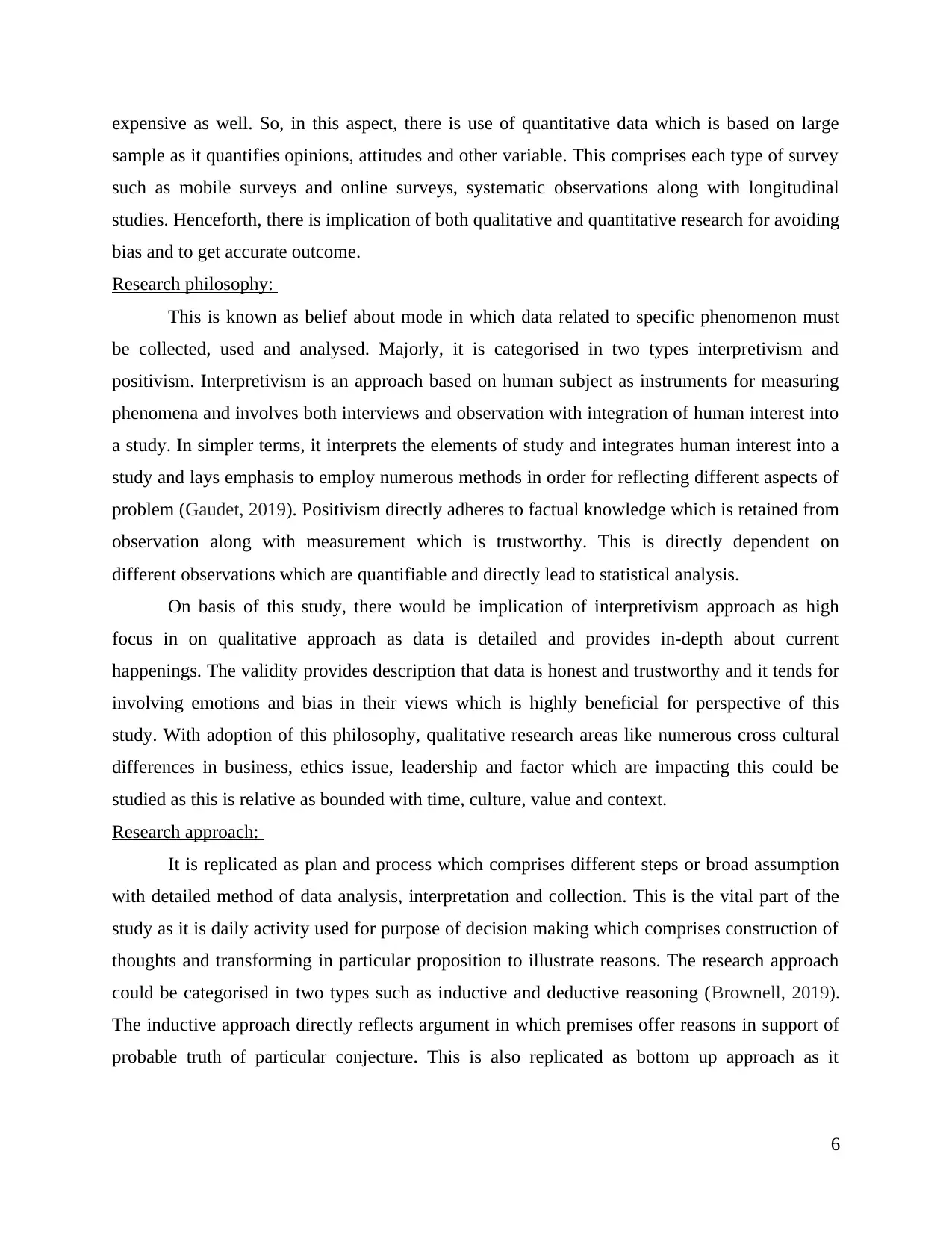
expensive as well. So, in this aspect, there is use of quantitative data which is based on large
sample as it quantifies opinions, attitudes and other variable. This comprises each type of survey
such as mobile surveys and online surveys, systematic observations along with longitudinal
studies. Henceforth, there is implication of both qualitative and quantitative research for avoiding
bias and to get accurate outcome.
Research philosophy:
This is known as belief about mode in which data related to specific phenomenon must
be collected, used and analysed. Majorly, it is categorised in two types interpretivism and
positivism. Interpretivism is an approach based on human subject as instruments for measuring
phenomena and involves both interviews and observation with integration of human interest into
a study. In simpler terms, it interprets the elements of study and integrates human interest into a
study and lays emphasis to employ numerous methods in order for reflecting different aspects of
problem (Gaudet, 2019). Positivism directly adheres to factual knowledge which is retained from
observation along with measurement which is trustworthy. This is directly dependent on
different observations which are quantifiable and directly lead to statistical analysis.
On basis of this study, there would be implication of interpretivism approach as high
focus in on qualitative approach as data is detailed and provides in-depth about current
happenings. The validity provides description that data is honest and trustworthy and it tends for
involving emotions and bias in their views which is highly beneficial for perspective of this
study. With adoption of this philosophy, qualitative research areas like numerous cross cultural
differences in business, ethics issue, leadership and factor which are impacting this could be
studied as this is relative as bounded with time, culture, value and context.
Research approach:
It is replicated as plan and process which comprises different steps or broad assumption
with detailed method of data analysis, interpretation and collection. This is the vital part of the
study as it is daily activity used for purpose of decision making which comprises construction of
thoughts and transforming in particular proposition to illustrate reasons. The research approach
could be categorised in two types such as inductive and deductive reasoning (Brownell, 2019).
The inductive approach directly reflects argument in which premises offer reasons in support of
probable truth of particular conjecture. This is also replicated as bottom up approach as it
6
sample as it quantifies opinions, attitudes and other variable. This comprises each type of survey
such as mobile surveys and online surveys, systematic observations along with longitudinal
studies. Henceforth, there is implication of both qualitative and quantitative research for avoiding
bias and to get accurate outcome.
Research philosophy:
This is known as belief about mode in which data related to specific phenomenon must
be collected, used and analysed. Majorly, it is categorised in two types interpretivism and
positivism. Interpretivism is an approach based on human subject as instruments for measuring
phenomena and involves both interviews and observation with integration of human interest into
a study. In simpler terms, it interprets the elements of study and integrates human interest into a
study and lays emphasis to employ numerous methods in order for reflecting different aspects of
problem (Gaudet, 2019). Positivism directly adheres to factual knowledge which is retained from
observation along with measurement which is trustworthy. This is directly dependent on
different observations which are quantifiable and directly lead to statistical analysis.
On basis of this study, there would be implication of interpretivism approach as high
focus in on qualitative approach as data is detailed and provides in-depth about current
happenings. The validity provides description that data is honest and trustworthy and it tends for
involving emotions and bias in their views which is highly beneficial for perspective of this
study. With adoption of this philosophy, qualitative research areas like numerous cross cultural
differences in business, ethics issue, leadership and factor which are impacting this could be
studied as this is relative as bounded with time, culture, value and context.
Research approach:
It is replicated as plan and process which comprises different steps or broad assumption
with detailed method of data analysis, interpretation and collection. This is the vital part of the
study as it is daily activity used for purpose of decision making which comprises construction of
thoughts and transforming in particular proposition to illustrate reasons. The research approach
could be categorised in two types such as inductive and deductive reasoning (Brownell, 2019).
The inductive approach directly reflects argument in which premises offer reasons in support of
probable truth of particular conjecture. This is also replicated as bottom up approach as it
6
⊘ This is a preview!⊘
Do you want full access?
Subscribe today to unlock all pages.

Trusted by 1+ million students worldwide
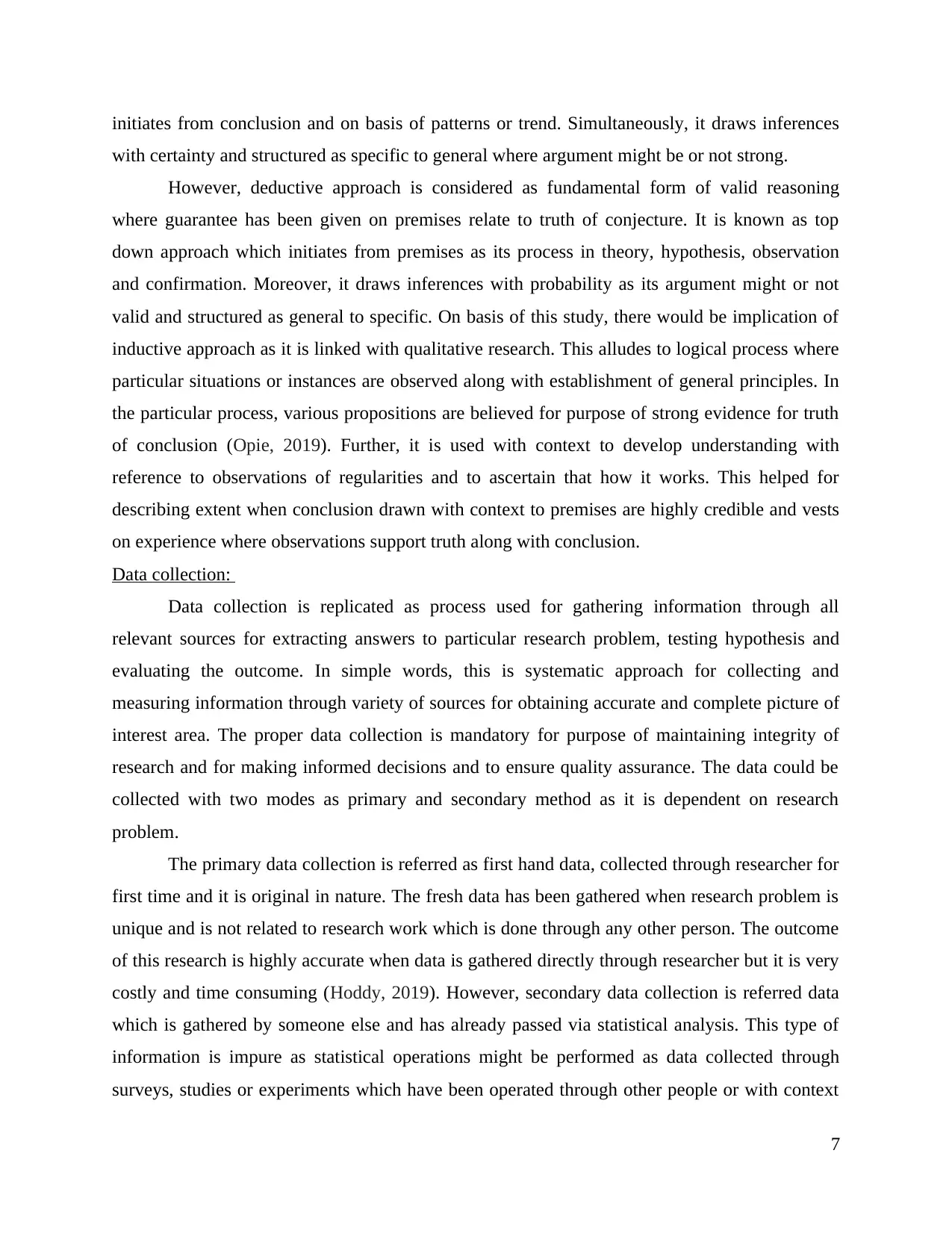
initiates from conclusion and on basis of patterns or trend. Simultaneously, it draws inferences
with certainty and structured as specific to general where argument might be or not strong.
However, deductive approach is considered as fundamental form of valid reasoning
where guarantee has been given on premises relate to truth of conjecture. It is known as top
down approach which initiates from premises as its process in theory, hypothesis, observation
and confirmation. Moreover, it draws inferences with probability as its argument might or not
valid and structured as general to specific. On basis of this study, there would be implication of
inductive approach as it is linked with qualitative research. This alludes to logical process where
particular situations or instances are observed along with establishment of general principles. In
the particular process, various propositions are believed for purpose of strong evidence for truth
of conclusion (Opie, 2019). Further, it is used with context to develop understanding with
reference to observations of regularities and to ascertain that how it works. This helped for
describing extent when conclusion drawn with context to premises are highly credible and vests
on experience where observations support truth along with conclusion.
Data collection:
Data collection is replicated as process used for gathering information through all
relevant sources for extracting answers to particular research problem, testing hypothesis and
evaluating the outcome. In simple words, this is systematic approach for collecting and
measuring information through variety of sources for obtaining accurate and complete picture of
interest area. The proper data collection is mandatory for purpose of maintaining integrity of
research and for making informed decisions and to ensure quality assurance. The data could be
collected with two modes as primary and secondary method as it is dependent on research
problem.
The primary data collection is referred as first hand data, collected through researcher for
first time and it is original in nature. The fresh data has been gathered when research problem is
unique and is not related to research work which is done through any other person. The outcome
of this research is highly accurate when data is gathered directly through researcher but it is very
costly and time consuming (Hoddy, 2019). However, secondary data collection is referred data
which is gathered by someone else and has already passed via statistical analysis. This type of
information is impure as statistical operations might be performed as data collected through
surveys, studies or experiments which have been operated through other people or with context
7
with certainty and structured as specific to general where argument might be or not strong.
However, deductive approach is considered as fundamental form of valid reasoning
where guarantee has been given on premises relate to truth of conjecture. It is known as top
down approach which initiates from premises as its process in theory, hypothesis, observation
and confirmation. Moreover, it draws inferences with probability as its argument might or not
valid and structured as general to specific. On basis of this study, there would be implication of
inductive approach as it is linked with qualitative research. This alludes to logical process where
particular situations or instances are observed along with establishment of general principles. In
the particular process, various propositions are believed for purpose of strong evidence for truth
of conclusion (Opie, 2019). Further, it is used with context to develop understanding with
reference to observations of regularities and to ascertain that how it works. This helped for
describing extent when conclusion drawn with context to premises are highly credible and vests
on experience where observations support truth along with conclusion.
Data collection:
Data collection is replicated as process used for gathering information through all
relevant sources for extracting answers to particular research problem, testing hypothesis and
evaluating the outcome. In simple words, this is systematic approach for collecting and
measuring information through variety of sources for obtaining accurate and complete picture of
interest area. The proper data collection is mandatory for purpose of maintaining integrity of
research and for making informed decisions and to ensure quality assurance. The data could be
collected with two modes as primary and secondary method as it is dependent on research
problem.
The primary data collection is referred as first hand data, collected through researcher for
first time and it is original in nature. The fresh data has been gathered when research problem is
unique and is not related to research work which is done through any other person. The outcome
of this research is highly accurate when data is gathered directly through researcher but it is very
costly and time consuming (Hoddy, 2019). However, secondary data collection is referred data
which is gathered by someone else and has already passed via statistical analysis. This type of
information is impure as statistical operations might be performed as data collected through
surveys, studies or experiments which have been operated through other people or with context
7
Paraphrase This Document
Need a fresh take? Get an instant paraphrase of this document with our AI Paraphraser
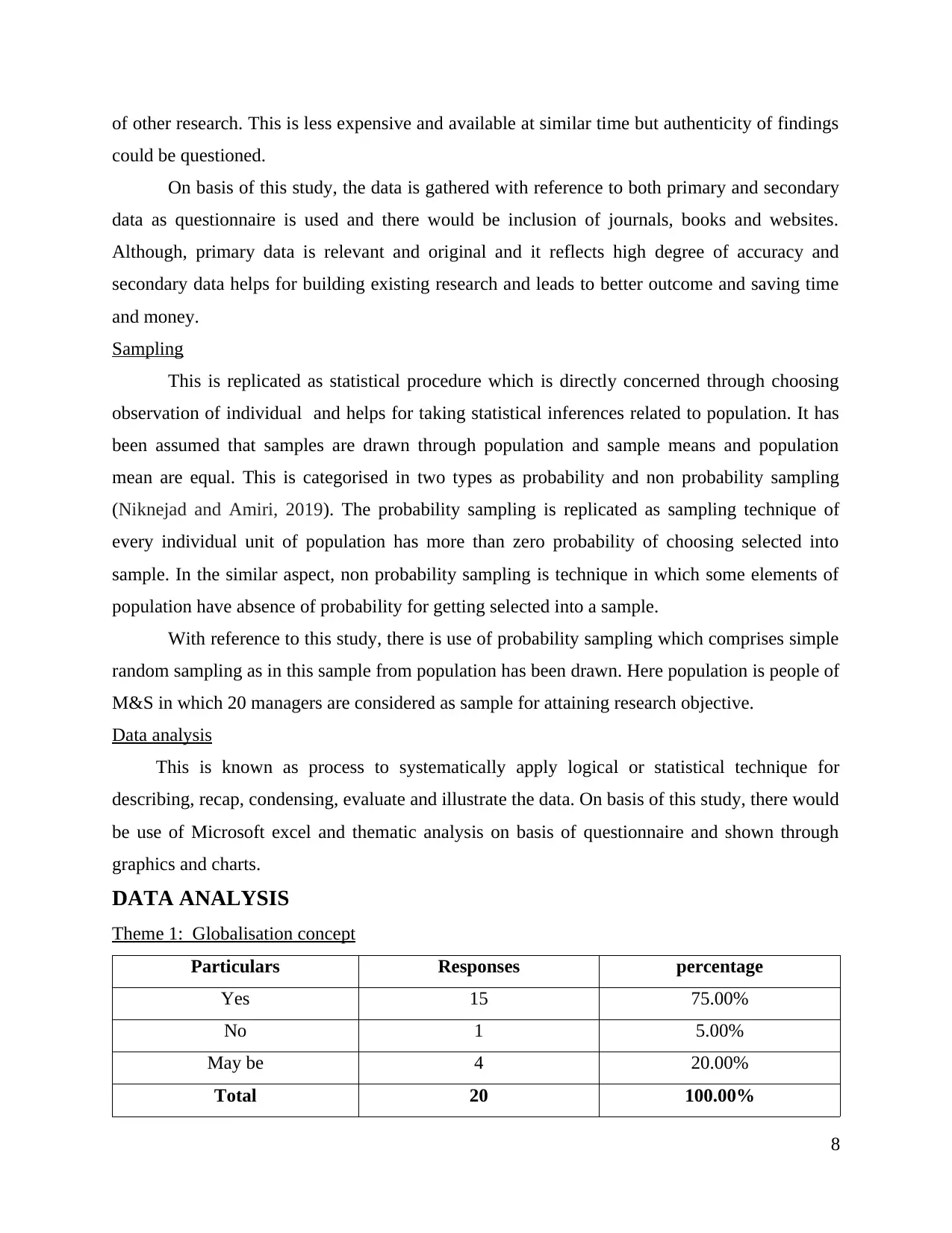
of other research. This is less expensive and available at similar time but authenticity of findings
could be questioned.
On basis of this study, the data is gathered with reference to both primary and secondary
data as questionnaire is used and there would be inclusion of journals, books and websites.
Although, primary data is relevant and original and it reflects high degree of accuracy and
secondary data helps for building existing research and leads to better outcome and saving time
and money.
Sampling
This is replicated as statistical procedure which is directly concerned through choosing
observation of individual and helps for taking statistical inferences related to population. It has
been assumed that samples are drawn through population and sample means and population
mean are equal. This is categorised in two types as probability and non probability sampling
(Niknejad and Amiri, 2019). The probability sampling is replicated as sampling technique of
every individual unit of population has more than zero probability of choosing selected into
sample. In the similar aspect, non probability sampling is technique in which some elements of
population have absence of probability for getting selected into a sample.
With reference to this study, there is use of probability sampling which comprises simple
random sampling as in this sample from population has been drawn. Here population is people of
M&S in which 20 managers are considered as sample for attaining research objective.
Data analysis
This is known as process to systematically apply logical or statistical technique for
describing, recap, condensing, evaluate and illustrate the data. On basis of this study, there would
be use of Microsoft excel and thematic analysis on basis of questionnaire and shown through
graphics and charts.
DATA ANALYSIS
Theme 1: Globalisation concept
Particulars Responses percentage
Yes 15 75.00%
No 1 5.00%
May be 4 20.00%
Total 20 100.00%
8
could be questioned.
On basis of this study, the data is gathered with reference to both primary and secondary
data as questionnaire is used and there would be inclusion of journals, books and websites.
Although, primary data is relevant and original and it reflects high degree of accuracy and
secondary data helps for building existing research and leads to better outcome and saving time
and money.
Sampling
This is replicated as statistical procedure which is directly concerned through choosing
observation of individual and helps for taking statistical inferences related to population. It has
been assumed that samples are drawn through population and sample means and population
mean are equal. This is categorised in two types as probability and non probability sampling
(Niknejad and Amiri, 2019). The probability sampling is replicated as sampling technique of
every individual unit of population has more than zero probability of choosing selected into
sample. In the similar aspect, non probability sampling is technique in which some elements of
population have absence of probability for getting selected into a sample.
With reference to this study, there is use of probability sampling which comprises simple
random sampling as in this sample from population has been drawn. Here population is people of
M&S in which 20 managers are considered as sample for attaining research objective.
Data analysis
This is known as process to systematically apply logical or statistical technique for
describing, recap, condensing, evaluate and illustrate the data. On basis of this study, there would
be use of Microsoft excel and thematic analysis on basis of questionnaire and shown through
graphics and charts.
DATA ANALYSIS
Theme 1: Globalisation concept
Particulars Responses percentage
Yes 15 75.00%
No 1 5.00%
May be 4 20.00%
Total 20 100.00%
8
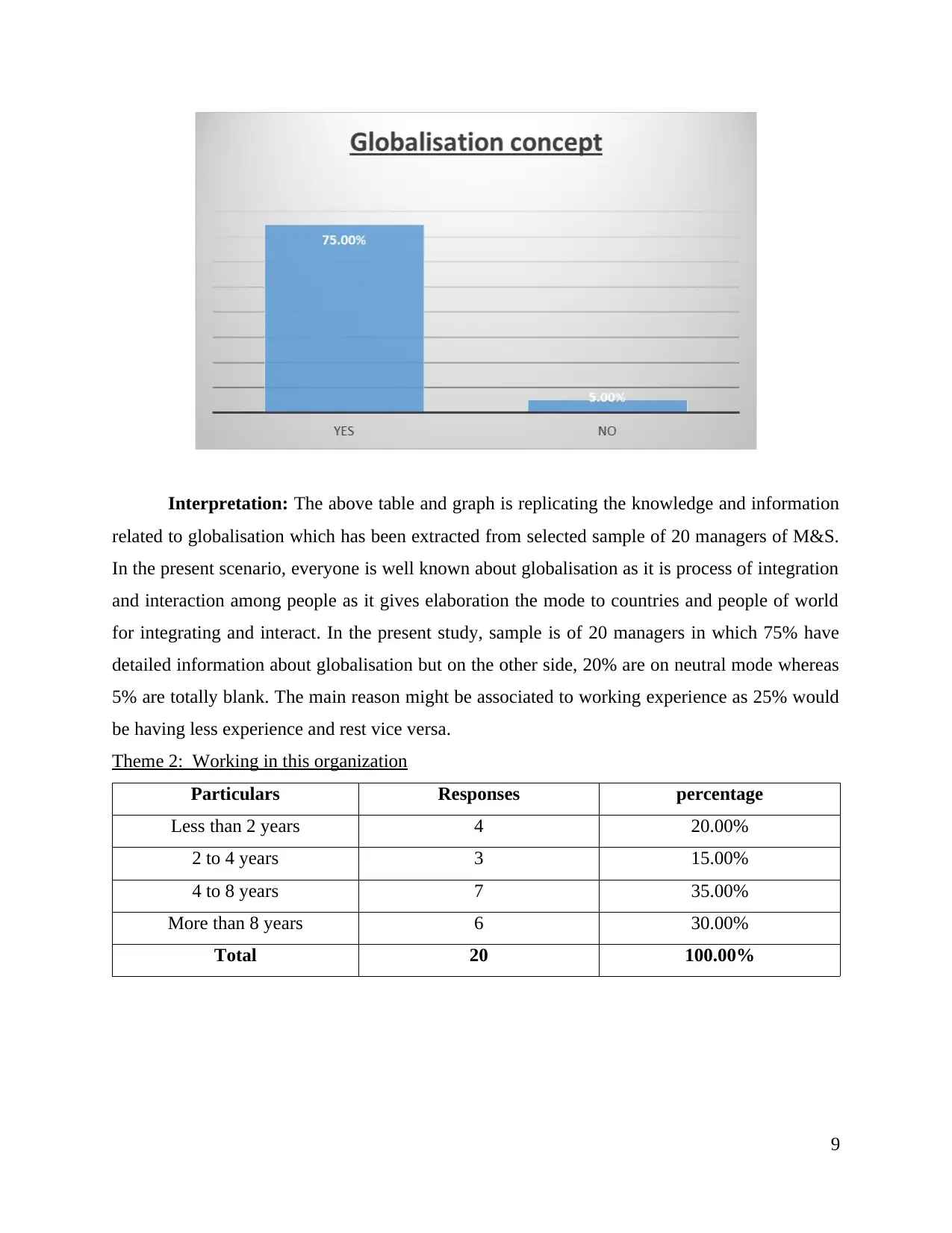
Interpretation: The above table and graph is replicating the knowledge and information
related to globalisation which has been extracted from selected sample of 20 managers of M&S.
In the present scenario, everyone is well known about globalisation as it is process of integration
and interaction among people as it gives elaboration the mode to countries and people of world
for integrating and interact. In the present study, sample is of 20 managers in which 75% have
detailed information about globalisation but on the other side, 20% are on neutral mode whereas
5% are totally blank. The main reason might be associated to working experience as 25% would
be having less experience and rest vice versa.
Theme 2: Working in this organization
Particulars Responses percentage
Less than 2 years 4 20.00%
2 to 4 years 3 15.00%
4 to 8 years 7 35.00%
More than 8 years 6 30.00%
Total 20 100.00%
9
related to globalisation which has been extracted from selected sample of 20 managers of M&S.
In the present scenario, everyone is well known about globalisation as it is process of integration
and interaction among people as it gives elaboration the mode to countries and people of world
for integrating and interact. In the present study, sample is of 20 managers in which 75% have
detailed information about globalisation but on the other side, 20% are on neutral mode whereas
5% are totally blank. The main reason might be associated to working experience as 25% would
be having less experience and rest vice versa.
Theme 2: Working in this organization
Particulars Responses percentage
Less than 2 years 4 20.00%
2 to 4 years 3 15.00%
4 to 8 years 7 35.00%
More than 8 years 6 30.00%
Total 20 100.00%
9
⊘ This is a preview!⊘
Do you want full access?
Subscribe today to unlock all pages.

Trusted by 1+ million students worldwide
1 out of 27
Related Documents
Your All-in-One AI-Powered Toolkit for Academic Success.
+13062052269
info@desklib.com
Available 24*7 on WhatsApp / Email
![[object Object]](/_next/static/media/star-bottom.7253800d.svg)
Unlock your academic potential
Copyright © 2020–2026 A2Z Services. All Rights Reserved. Developed and managed by ZUCOL.





